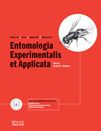Ver ítem
- xmlui.general.dspace_homeCentros Regionales y EEAsCentro Regional Patagonia NorteEEA BarilocheArtículos científicosxmlui.ArtifactBrowser.ItemViewer.trail
- Inicio
- Centros Regionales y EEAs
- Centro Regional Patagonia Norte
- EEA Bariloche
- Artículos científicos
- Ver ítem
A comparative analysis of host feeding and life-history traits in parasitoid wasps
Resumen
Feeding in insect parasitoids can have significant implications from behavioral and evolutionary ecology standpoints. Females of many species not only search for hosts to lay their eggs on, but also may use them as a food source. Host-feeding, as this behavior is known, occurs mostly in the Hymenoptera. There is some evidence of benefits of host feeding at the intraspecific level, but there are only few studies of the potential association between host
[ver mas...]
Feeding in insect parasitoids can have significant implications from behavioral and evolutionary ecology standpoints. Females of many species not only search for hosts to lay their eggs on, but also may use them as a food source. Host-feeding, as this behavior is known, occurs mostly in the Hymenoptera. There is some evidence of benefits of host feeding at the intraspecific level, but there are only few studies of the potential association between host feeding behavior and life-history traits across hymenopteran parasitoids. The main goal of this paper is to test for correlated evolution of host feeding and various other life-history traits, aiming for an understanding of the diversity of parasitoid life histories. For this, we performed a comparative analysis based mainly on phylogenetically independent contrasts (PIC), using data for 187 species of hymenopteran parasitoids, and (1) examined whether host-feeding behavior is correlated with life span, lifetime potential fecundity, and maximum egg load, (2) re-tested the potential evolutionary correlation suggested by Jervis et al. [Journal of Animal Ecology 70 (2001) 442] between host feeding and the ovigeny index (OI), and (3) re-tested the possible correlation between lifetime potential fecundity and life span across species and examined whether host feeding affects this relationship. Results indicate a positive evolutionary correlation between host feeding and both life span and maximum egg load, and a negative evolutionary correlation between host feeding and OI. Lifetime potential fecundity does not correlate with host feeding but correlates positively with life span. The effect of the interaction between host feeding and life span on potential fecundity was not significant. As has been noted in the past, the array of correlations between traits suggests the existence of adaptive suites of life-history traits involving trade-offs based on resource allocation patterns
[Cerrar]

Fuente
Entomologia experimentalis et applicata 159 (2) Special Issue : 172–180. (May 2016)
Fecha
2016-05
ISSN
0013-8703 (Print)
1570-7458 (Online)
1570-7458 (Online)
Formato
pdf
Tipo de documento
artículo
Palabras Claves
Derechos de acceso
Restringido
 Excepto donde se diga explicitamente, este item se publica bajo la siguiente descripción: Creative Commons Attribution-NonCommercial-ShareAlike 2.5 Unported (CC BY-NC-SA 2.5)
Excepto donde se diga explicitamente, este item se publica bajo la siguiente descripción: Creative Commons Attribution-NonCommercial-ShareAlike 2.5 Unported (CC BY-NC-SA 2.5)

